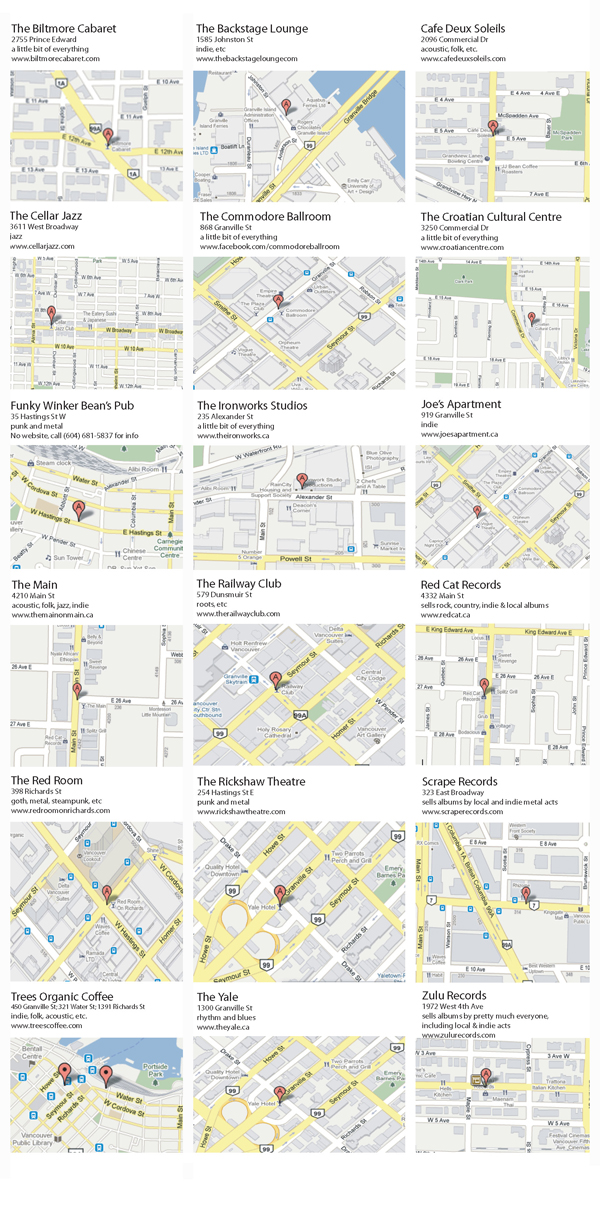The Giggle Guide: where to find improv and standup comedy nights in the GVRD
February 16, 2011 by Amanda Punshon · Leave a Comment
New York, Boston, Chicago and Montreal are all funny cities. Together, they have produced some of the biggest names in comedy — instantly recognizable people such as Jon Stewart, Conan O’Brien, Bonnie Hunt and Caroline Rhea.
But what about Vancouver?
While it’s true that we are not as well-known for our comedy scene as Just For Laughs staples such as Montreal, Vancouver does have a pretty solid comedy scene. Colin Mochrie (Whose Line is it Anyway, This Hour Has 22 Minutes,) Ryan Stiles (the Drew Carey Show, Two and a Half Men,) and Seth Rogen (Freaks and Geeks, Superbad) are all from here, and local and international comedians play Vancouver’s comedy and nightclubs every week. Show tickets are usually cheaper than the latest 3-D Justin Beiber cinematic extravaganza, and most of the venues are licensed.
The only problem is that finding comedy nights in Vancouver isn’t easy. That’s why we’ve created the Giggle Guide. Simply pick the night you want to go out and click through the available options to see what’s happening. Clicking the map for a venue will take you to the Google Maps website, where you can get more detailed directions.
A caveat: Vancouver’s comedy scene is like a beach. New things are always washing up as the old drift away, making it impossible for this guide to be comprehensive. It’s always a good idea to phone the venues before heading out, just in case they’ve changed or cancelled their night. Most venues are 19+.
*The Montemartre Cafe has comedy nights once a month; Zesty’s Restaurant occasionally hosts comedy events.
Infographic by Amanda Punshon and Sarah Casimong
Filming in Vancouver: $650 a day for a park, $95 an hour for a cop
January 30, 2011 by Meagan Gill · Leave a Comment
The cost of filming is one of the biggest issues facing independent filmmakers in Vancouver.
The City of Vancouver’s Vancouver Film Office was set up to deal with on-location filming while ensuring the safety of the public and protecting the rights of local neighbourhoods. It handles all productions in Vancouver, ranging from independent films and commercials to feature films and television series. And while the office helps production companies get the authorization to film on public property and on city streets, the price can be high, especially for independent filmmakers.
According to the city’s website, it costs about $650 a day to film at any major parks or beaches, while the permit for filming in neighbourhood parks is about $590 a day.
Any filming that affects the normal use of public property requires a Film Activity Permit. Each day of filming or different location requires at least one Film Activity Permit, which is approximately $150.
A street-use permit is approximately $150, but the amount of street space being used for filming will determine how many permits are required to shoot the scene.
The use of a Vancouver police officer in filming is $95 an hour and a sergeant is $119 an hour. Using a fire engine in filming costs $110 per hour and firefighters are $82 per hour each. Vancouver Fire and Rescue Services Training Classroom is available for $400 per day and the Training Academy is available at the rate of $1,500 per day.
Lori Clarkson, film liaison at the Vancouver Film Office, says that the cost of film permits is the same for independent filmmakers as it is for professional filmmakers.
“From our point of view, if a production crew is asking us to do some work, it doesn’t matter whose asking us to do the work. We have to be paid for the work we do, so it doesn’t matter if it’s a huge feature or a small independent feature,” said Clarkson.
There are some ways the city can cut back on some of the costs for independent filmmakers.
“One of the things that we can do is consider lessening the cost of a street-use permit, but it depends on what it is they need,” Clarkson said. “Typically, our fees are set by city council, so they are pretty much set in stone. But in some situations, we might be able to knock a little bit more off the cost of a permit.”
To find out more about the cost of film permits in the city of Vancouver, visit the Vancouver Film Office website.
Social media changes funding, distribution for indie filmmakers
January 30, 2011 by Jocelyn Gollner · 1 Comment
Social media is changing the way that we do almost everything and that now includes how independent filmmakers are funding and distributing their films.
“Everything is changing so quickly that 10 years from now, we won’t even recognize what it is right now,” said Ryan Catherwood, an independent filmmaker from Vancouver.

IndieGoGo is one site that filmmakers are using to help get funding for their films.
Besides the obvious social media forms, such as Facebook and Twitter, there are also specialty sites such as IndieGoGo that filmmakers are using for their films. IndieGoGo defines itself as an international funding platform.
Catherwood has recently starting using IndieGoGo and said that it’s a different way to raise funds for a film.
You “basically just put a pitch up online and then cross your fingers that people want to invest in it and become a part of it,” he said. Anyone can create an account, and attempt to raise funds for almost anything.
This money can make a huge difference to independent filmmakers.
“I work at a rental shop and, like a lot of my friends, we’re all filmmakers and we want to spend our time and our energy and our passion in film, but we have to get supplementary jobs to afford that,” Catherwood said.
Funding a film isn’t the only problem; distributing that film is also sometimes an obstacle.
“Distribution is continually becoming a problem, besides just putting it up for free online,” Catherwood said. “There are not a lot of options for filmmakers these days. It’s kind of like the elephant in the room that no one wants to talk about right now, but I keep trying to bring it up and just say like we have to find a way to make money from our films.”
As much as social media can help filmmakers distribute their films, it also poses its own set of problems.
“YouTube came along and it’s kind of the Coca-Cola of Internet broadcasting. It’s hard to get an edge on them,” Catherwood said.
Amid all the changes, Catherwood doesn’t know what the future holds.
“I don’t know where the independents are going to end up,” he said. “Until the independents, like one of our own, creates something to distribute indie films on a larger scale, nothing is going to change. That’s kind of how I see it.”
What is Indie?
January 17, 2011 by Jocelyn Gollner · Leave a Comment
Where to find indie music in Vancouver (article below graphic):
Infographic by Amanda Punshon
We’ve heard about indie music, indie films, and other indie arts.
But what exactly does it mean?
It’s more than guys in tight jeans who listen to bands that no one has ever heard of.
Oswaldo Perez Cabrera is involved with the promotion and public relations for VanMusic.ca, a Vancouver-based website dedicated to giving exposure to indie bands.
He defines indie as being “all forms of art or culture that are outside of the mainstream media.”
Kwantlen students at the Richmond campus were also asked how they would describe indie, specifically indie music.
“Hmmm, that’s a good question,” said Alexandra Pastega, an English and marketing student. “Slightly acoustic. It has a kind of soft punk vibe to it in my opinion. Indie bands to me would constitute a band maybe like Metric. Kind of edgy but soft.”
Ian Nobak, a general studies student, said that indie means “independent. It would be maybe students making music, like downloading software and mixing it themselves.”
There is quite a difference, however, between a band such as Metric, which gets played on the radio, tours worldwide and has a large fan base, and students mixing music in their basement.
“There are people that start as indie and they move into more established companies,” Cabrera said. “There are other bands that prefer to keep it indie. Even some indie record companies, some indie labels, that start with a couple of bands, with their friends, and they become bigger and bigger. So then we have this question of how big they have to be to still be considered indie?”
It’s a question with no definitive answer. Everyone seems to have his or her own opinion.
But small or big, Cabrera believes that having independent artists is an important aspect to any city.
“Since [indie artists] don’t have any censorship or they aren’t subjected to what big companies are going to decide for them, it’s a very important voice to the culture of any city. It shows a little bit what the problems are in the city, it talks a bit about social issues, a lot of the time about environmental issues, they talk about what is happening in the subcultures of the city.”
He also believes that indie music is a form of resistance.
“It’s a resistance against the whole establishment. Because right now, most of radio and television, they tell you what to listen to, they tell you what to buy, they tell you how to think. And all these indie artists, it’s a resistance to all of that. Because they are talking about different things. They are talking about things that are contrary to what the establishment or what the mainstream is telling you to do. That’s a form of resistance.”




